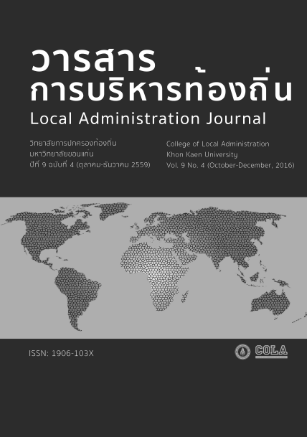กระบวนการลักลอบตัดไม้พะยูงในเขตอุทยานแห่งชาติภูเวียง จังหวัดขอนแก่น
Keywords:
กระบวนการลักลอบตัดไม้, ไม้พะยูง, อุทยานแห่งชาติภูเวียง, Stealth Process, Phayung Rosewood, Phu Wiang National ParkAbstract
การวิจัยในครั้งนี้โดยมีวัตถุประสงค์เพื่อศึกษากระบวนการลักลอบตัดไม้พะยูงและเสนอแนะมาตรการในการป้องกันการลักลอบตัดไม้พะยูงในเขตอุทยานแห่งชาติภูเวียง จังหวัดขอนแก่นโดยการสัมภาษณ์ผู้ที่เคยกระทำความผิดในคดีเกี่ยวกับการลักลอบตัดไม้พะยูง และเจ้าหน้าที่รัฐผู้มีหน้าที่เกี่ยวข้อง ได้แก่เจ้าหน้าที่สถานีตำรวจภูธรเวียงเก่า และเจ้าหน้าที่อุทยานแห่งชาติ จำนวน 15 คน วิเคราะห์ข้อมูลด้วยการวิเคราะห์สังเคราะห์และตีความแล้วนำเสนอผลการศึกษาเป็นความเรียง ผลการศึกษาพบว่ากระบวนการลักลอบตัดไม้พะยูงในอุทยานแห่งชาติภูเวียงนั้นจะมี 2 ช่วง โดยช่วงแรกกลุ่มนายทุนหรือผู้มีอิทธิพล ได้ว่าจ้างให้ชาวบ้านพื้นที่เป็นผู้นำทางและทำหน้าที่ชี้จุดต้นไม้พะยูงในป่าและช่วงหลังชาวบ้านกลุ่มนี้ได้เข้าไปลักลอบตัดไม้พะยูงโดยตรงเพื่อนำมาจำหน่ายให้แก่นายทุนหรือผู้มีอิทธิพล ด้วยเหตุผลปัจจัยด้านราคาของไม้พะยูงแม้จะมีความเสี่ยงในการถูกจับกุมแต่ชาวบ้านกลุ่มนี้มองว่าคุ้ม เมื่อแลกกับค่าตอบแทนที่มีมูลค่าสูง แนวทางป้องกันและแก้ไขปัญหาการลักลอบตัดไม้พะยูงในเขตอุทยานแห่งชาติภูเวียงเสนอให้มีการรณรงค์ให้ประชาชนทราบถึงบทลงโทษของการละเมิดพระราชบัญญัติอุทยานแห่งชาติ พ.ศ. 2504 และกฎหมายตามพระราชบัญญัติป่าไม้ พ.ศ. 2484 และควรมีการส่งเสริมเศรษฐกิจในพื้นที่ทั้งอาชีพและรายได้ที่เหมาะสม เพื่อให้ชาวบ้านในพื้นที่มีรายได้และคุณภาพชีวิตความเป็นอยู่ที่ดีขึ้น
The Stealth Process of Phayung rosewood illegal Logging in Phu Wiang National Park of Khon Kaen Province
The objectives of this research were to study about the illegal logging of Phayung rosewood and to recommend the preventive measures for illegal logging of Phayung rosewood in Phu Wiang National Park, Khon Kaen Province. The study was performed by interviewing 15 informants, which included both the people who committed crime in illegal logging and the relevant government officers from Wiang Kao police station and Phu Wiang National Park. Findings from the analysis, synthesis, and interpretation of data were presented in descriptive format. The study found that illegal deforestation of Phayung rosewood in the national park comprised two phases. In the first phase, influential persons or financiers hired local villagers for leading to the locations of Phayung rosewood trees in the forest. In the second phase, the villagers became directly involved in illegal logging and selling to the influential persons or financiers. Because Phayung rosewood is highly valuable, the villagers thought it was worth the risk to commit the crime. To prevent and solve the problem, there should be campaigns to raise awareness of people about the penalty or punishment for violating the National Park Act of B.E. 2504 (1961) and the Forests Act of B.E. 2484 (1941) and measures to promote local economy and incomes for local people to have better quality of life.
Downloads
Published
How to Cite
Issue
Section
License
The copyright of all articles published in the Local Administration Journalis owned by the College of Local Administration, Khon Kaen University.



